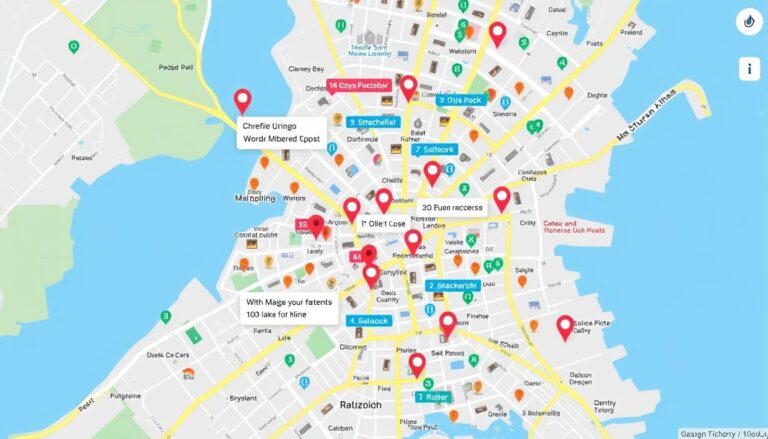Utilizing local SEO tools and software is essential for enhancing your business's online visibility in search results. These tools help you manage your Google Business Profile, ensuring your name, address, and phone number are consistent across directories, which builds trust. You can also track customer reviews and analyze key performance metrics, like impressions and conversions. Various tools exist for listing management, keyword research, and competitor analysis, allowing you to stay competitive. By selecting the right tools tailored to your specific needs, you can make data-driven decisions that improve your local rankings and attract more customers. There's much more to explore!
Importance of Local SEO Tools
Maximizing your business's online presence hinges on utilizing local SEO tools effectively. These tools are essential for enhancing your visibility in local search results, which can lead to increased customer engagement and foot traffic.
One of the key advantages of local SEO tools is their ability to streamline the management of Google Business Profiles, ensuring that your comprehensive business information is accurate and consistent across various directories. By ensuring accurate and consistent NAP (Name, Address, Phone) information across various directories, you strengthen your credibility and improve local rankings.
Moreover, local SEO tools facilitate effective online reputation management. They help you monitor and respond to customer reviews, which greatly impact your search rankings and consumer trust.
Advanced keyword research tools within these platforms assist you in identifying relevant local search intent keywords, allowing you to connect more effectively with your target audience.
Additionally, the analytics and reporting capabilities of local SEO tools provide actionable insights. You can track performance metrics like search impressions, clicks, and conversions, which help optimize your local marketing strategies.
Types of Local SEO Tools
Understanding the different types of local SEO tools is essential for effectively boosting your online presence. These tools are designed to help you enhance your visibility in local search results and optimize your SEO strategies. For instance, utilizing effective local link building strategies can greatly improve your overall SEO efforts.
Here are three key types:
- Listing Management Tools: These guarantee that your NAP (Name, Address, Phone) information is accurate across various directories. This consistency builds trust with search engines and customers alike.
- Review Management Tools: These track and analyze customer feedback from platforms like Google and Yelp. By managing reviews effectively, you can improve your local reputation and engage better with your audience.
- Keyword Research Tools: These help you identify relevant local search intent keywords. By targeting specific phrases, you can enhance your content and visibility in local search results.
Additionally, there are competitor analysis tools that evaluate your rivals' online presence, as well as rank tracking tools that monitor your keyword ranking progress.
Utilizing these local SEO tools won't only improve your online visibility but also help you stay ahead in an increasingly competitive market.
Analytics and Reporting Tools
Local SEO tools play an essential role in enhancing your online visibility, but without the right analytics and reporting tools, you can't truly measure your success. Tools like Google Analytics and Google Search Console are crucial for tracking data insights and understanding user behavior, especially since effective SEO builds credibility and trust with consumers.
Google Analytics 4 (GA4) offers thorough data collection, but you'll need to accurately set up key events and explore the landing page reports to assess your SEO performance effectively.
Google Search Console is equally important for daily monitoring. It provides click data and valuable insights into your organic search performance, although it does have some limitations in query filtering.
Additionally, Google Business Profile Insights can offer basic metrics such as search query impressions and call counts, but remember that data thresholds may impact reporting accuracy.
Leveraging Looker Studio can enhance your reporting capabilities by integrating multiple data sources. This allows you to create customized dashboards, simplifying the analysis of specific performance metrics over time.
Ultimately, these analytics and reporting tools are critical for measuring the effectiveness of your local SEO strategy and making informed decisions for future campaigns.
Google Tools for Local SEO
When it comes to boosting your online presence, Google offers a suite of powerful tools designed specifically for local SEO. These tools can help enhance your visibility and optimize your local SEO strategies effectively.
Here are three essential Google tools you should use:
- Google Business Profile (GBP): This tool allows you to manage your business listings across Google Search and Maps. It facilitates customer interactions through online reviews and updates, improving your local visibility.
- Google Search Console (GSC): With GSC, you can monitor your website's performance. It provides insights into clicks, impressions, and CTR, helping you adjust your local SEO strategies based on user engagement data.
- Google Ads Keyword Planner: This tool provides localized keyword search volume data, enabling you to target specific geographic areas effectively. Understanding these trends can help you fine-tune your content and improve your local rank tracker.
Performance Tracking Tools
Tracking your performance is crucial for refining your local SEO efforts. To achieve this, you can leverage various performance tracking tools that provide valuable insights into your online presence. Google Analytics 4 and Google Search Console are two key local SEO tools that help you measure website performance by analyzing user behavior, traffic sources, and critical SEO metrics like clicks and impressions.
Additionally, tools like CallRail and BrightLocal enable you to monitor phone call conversions and local search rankings, helping you identify high-traffic pages that may need optimization.
For deeper insights, Looker Studio allows you to integrate various data sources, creating customized dashboards for long-term performance analysis and team collaboration.
If you're focused on local keyword tracking, Places Scout and Local Falcon offer accurate tracking and SERP screenshot features, which help diagnose ranking changes and fluctuations in local SEO performance.
Moreover, Google Business Profile Insights, connected to Looker Studio via API, can enhance your data visibility for up to 18 months, providing valuable year-over-year comparisons—crucial for seasonal businesses.
Keyword Research and Analysis
Keyword research is the cornerstone of any effective local SEO strategy, as it helps you identify the specific terms potential customers use to find products or services in your area. By understanding these keywords, you can greatly improve your visibility in local search results.
Here are three essential steps to enhance your keyword research:
- Utilize local SEO tools: Tools like Google Ads Keyword Planner give you accurate local search volume data, allowing you to target keywords at granular geographic levels such as state, city, or zip code.
- Explore advanced tools: Platforms like SEMrush and Ahrefs enable you to discover long-tail keywords. These often have less competition and can lead to higher conversion rates for your local business.
- Analyze and adjust: Regularly assess your keyword performance. Make adjustments based on search trends to keep your strategy competitive and relevant.
Incorporate these keywords naturally into your website content, meta tags, and Google Business Profile descriptions. This enhances relevance and boosts your rankings in local search queries, ultimately attracting more customers to your business.
Local SEO Audit Tools
In the competitive landscape of local search, leveraging local SEO audit tools is essential for optimizing your online presence. These tools evaluate your local search performance by examining website optimization and citation accuracy. They help identify areas for improvement, ensuring your business stands out in local markets.
One vital aspect these tools assess is the consistency of NAP (Name, Address, Phone) data across various directories. Maintaining accurate and uniform NAP information is important for building trust with both search engines and potential customers.
Moreover, local SEO audit tools often provide actionable reports that benchmark your local optimization efforts against competitors, giving you a clear picture of your relative performance.
Additionally, many tools offer insights into competitor analysis, allowing you to uncover gaps and opportunities in your own local SEO strategy. By generating scores based on the effectiveness of your efforts, these tools highlight important issues that require immediate attention, ultimately improving your search visibility.
For local businesses aiming to enhance their online presence, utilizing these audit tools can greatly impact your ability to attract customers and drive growth.
Technical SEO Tools
Understanding technical audits is vital for optimizing your website's performance and search visibility.
You'll want to explore essential technical SEO features that can enhance your site's health, like fixing broken links and improving loading speed.
Utilizing tools for SERP analysis will further help you track your progress and identify areas for improvement, ensuring your local SEO strategy remains effective.
Importance of Technical Audits
Conducting regular technical audits is essential for maintaining a website's health and optimizing its performance. These audits help you identify issues that can hinder your site's effectiveness, guaranteeing you stay competitive in local search results.
By using local SEO tools, you can streamline this process and enhance your search engine optimization strategies.
Here are three key benefits of technical audits:
- Improved User Experience: Regular audits identify slow loading speeds, broken links, and mobile responsiveness issues, enhancing overall user satisfaction.
- Enhanced Visibility: Evaluating structured data during audits boosts your site's presence in search results, improving click-through rates and driving more traffic.
- Crawlability and Indexability: Thorough audits guarantee compliance with search engine guidelines, helping your site become more accessible to search engines and improving its chances of ranking higher.
Essential Technical SEO Features
Technical audits set the stage for utilizing specific tools that can greatly enhance your website's SEO performance. By employing local SEO tools, you can effectively assess your site's technical health.
Tools like Screaming Frog SEO Spider enable you to perform in-depth website crawls, identifying crawl errors, broken links, and duplicate content that could harm your website performance.
Google Search Console is another essential resource, offering critical insights into your site. It helps you monitor metadata issues and mobile usability problems that can negatively impact your online presence and SERP results.
Don't overlook the importance of structured data markup tools. By implementing structured data, you can improve how search engines interpret your content, leading to richer snippets in search results.
This can remarkably enhance click-through rates and user engagement.
Tools for SERP Analysis
SERP analysis tools are vital for optimizing your website's visibility in search engine results. They help you track your local business listing performance, enabling you to make informed decisions that enhance your organic rankings.
Here are three top tools you should consider:
- Ahrefs: This powerful tool provides extensive SERP analysis features, allowing you to monitor keyword performance and see how your rankings change over time.
- GS Location Changer: With this tool, you can modify your IP address to accurately verify your local SERP rankings, which is essential for effective local SEO audits.
- Places Scout: It offers a SERP screenshot feature that helps visualize local and organic rankings, giving you actionable insights into your Google My Business performance.
Using these local SEO tools, you can efficiently conduct rank tracking, review monitoring, and technical audits.
They simplify the process of identifying fluctuations in keyword performance, ensuring you stay ahead in the competitive landscape.
Review Management Software
When it comes to managing your online reputation, review management software can be a game-changer. This type of software centralizes customer reviews from multiple platforms, making it easier for you to monitor and respond to feedback efficiently. By actively engaging with customer feedback, you enhance your brand reputation and build trust among potential clients.
Many review management solutions also include sentiment analysis features that help you assess review trends, providing valuable insights into customer satisfaction and areas needing improvement. With automated response capabilities, you can engage with customers promptly, streamlining the review process and showing that you value their opinions.
Moreover, integrating review management software with other marketing tools, such as CRM systems and social media platforms, creates a cohesive approach to managing customer feedback. This integration can greatly enhance your overall marketing strategies.
Utilizing review management software can lead to improved local SEO rankings, as positive reviews directly impact your visibility and performance in local search results. By focusing on customer reviews and feedback, you position your business for success in an increasingly competitive market.
Choosing the Right Tool
Choosing the right local SEO tool starts with evaluating your specific business needs.
You'll want to assess key features like listing management and review tracking, ensuring they align with your goals.
Assessing Specific Business Needs
Frequently reviewing your specific business needs is vital when selecting a local SEO tool. Understanding what you require helps you choose the best software for your goals. Here are three key aspects to think about:
- Feature Alignment: Identify important features like listing management, review monitoring, and keyword research that match your local marketing goals.
- Business Size and Locations: Reflect on the size of your business and how many locations you manage. Tools like BrightLocal and Semrush offer scalable pricing plans that can accommodate single or multiple locations, ensuring you only pay for what you need.
- User Experience: Review the user interface and ease of use. A more intuitive tool can boost productivity and enhance team collaboration in managing your local SEO efforts.
Additionally, robust analytics and reporting capabilities are essential for tracking performance metrics like search impressions and conversions.
Don't forget to research customer support options and user reviews, as reliable assistance can greatly impact your local SEO strategy.
Evaluating Tool Features
Selecting the right local SEO tool hinges on understanding the features that will best serve your business objectives. Start by evaluating essential capabilities like listing management, review tracking, and keyword research. These features help you maintain accurate business information and monitor customer feedback, which directly impacts your local search performance.
Next, look for tools offering robust competitor analysis. This allows you to identify gaps in your strategy and capitalize on strengths, giving you a competitive edge.
Additionally, prioritize tools with strong analytics capabilities. Tracking key metrics such as impressions, clicks, and customer engagement enables effective data-driven decision-making, helping you optimize your local SEO efforts.
A user-friendly interface is also important; it should integrate seamlessly with other marketing platforms to enhance your workflow efficiency.
As you explore different local SEO tools, pay attention to their pricing models. Many offer tiered subscription plans, making it easier to scale based on your business needs.
Comparing Pricing Options
When it comes to local SEO tools, understanding the pricing options can make a significant difference for your budget and strategy.
You'll find a variety of tools designed to meet different needs and budgets. Here are three popular choices to take into account:
- Semrush Local: Starting at $20 per month per location, this tool offers listing management and reputation management, with more advanced features available at higher tiers.
- BrightLocal: This all-in-one platform begins at $39 per month and includes a 14-day free trial. It focuses on presence tracking and reputation management, making it a great choice for local businesses.
- SE Ranking: Specializing in tracking local rankings, this tool starts at $62 per month and also offers a limited 14-day free trial for new users.
On the more budget-friendly side, Localo provides website building and local SEO monitoring starting at $29 per month per location.
As you compare these pricing options, take into account your specific needs and whether the free trials offered by many local SEO tools will give you the chance to test before committing.
Conclusion
In today's competitive digital landscape, leveraging local SEO tools is like having a treasure map for your business. With the right tools in your arsenal, you can uncover valuable insights, improve your online visibility, and attract more local customers. Remember, choosing the right tools is essential for your success. Just as a skilled navigator relies on their compass, you can rely on these resources to guide your local SEO strategy, ensuring your business stands out in the crowd.




